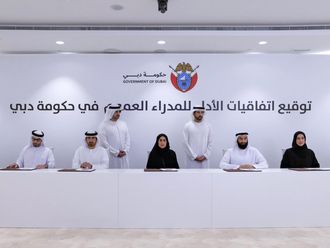Dubai: The Salma food aid project uses Nasa technology to preserve and deliver food to countries in crisis, said Shaima Al Zarouni, the Chief Executive Officer (CEO) of Dubai’s International Humanitarian City (IHC).
His Highness Shaikh Mohammad Bin Rashid Al Maktoum, Vice-President and Prime Minister of the UAE and Ruler of Dubai, launched the new food aid programme on Saturday.
Named after the first Emirati nurse Salma, the project aims to provide immediate food aid for one million people each year who are affected by crises across the globe.
Shaikh Mohammad announced that the Salma project’s first beneficiary is Gaza, which is currently under Israeli aggression, adding that the first batch of food aid to Gaza is only part of the comprehensive Emirati programme which provides treatment, food aid, medical supplies and reconstruction of Palestinians’ properties subjected to unjust aggression in Gaza.
“The time now is to act and provide relief, support and help and it is not the time for talking. We also call upon all countries and people to stand in solidarity with Palestinians in Gaza,” said Shaikh Mohammad.
Revealing details of the project, Shaima told Gulf News that the 100,000 meals, which were to reach Gaza on the first day of Eid through Jordan, are ready to eat.
“The food delivered by the Salma project will be cooked and ready to eat as many people who are in critical situation might not have access to a kitchen to cook. It will also be preserved in pouches that are used by Nasa astronauts, which have a long shelf life.”
Shaima pointed out that the Nasa pouches were chosen for this project because some areas of crisis cannot be accessed and these pouches will not be damaged if they are thrown from a plane.
She said that one pouch, which can feed two people, is supplied with nutritious wholesome food including halal meat. The project will provide the pouches in cooperation with the UN Relief and Works Agency for Palestine Refugees in the Near East (UNRWA) and the UN World Food Programme. IHC is a strategic partner that will provide logistical support for the initiative throughout the year.
“The 100,000 meals are the first of the 900,000 to come. They will not only go to Gaza, they will also include other countries that will, god forbid, suffer from a crisis such as wars, floods or any other natural disaster in the future, regardless of the country’s religious, ethnic or political status.”
The food pouches can be customised according to each country’s needs, said Shaima. She also said given the fact that 50 per cent of crises occur in this region, it is important to have accessibility to the Salma pouches.
Reports say four out of five countries that are most likely to be struck by natural disasters are countries with a Muslim majority and, according to the UN Refugee Agency, 70 per cent of refugees are Muslims.
Shaima said the Salma project will respond to any crisis in accordance with international standard period, which is within 72 hours. She also pointed out that the UAE responded to the Gaza crisis within 36 hours.
“The UAE and its leaders are proving to be front runners and pioneers in the humanitarian work by launching this project, which is complementary to the existing humanitarian projects.”
The Salma emergency food relief programme is a partnership between the Dubai Islamic Economy Development Centre (DIEDC) and the Awqaf, Minors Affairs Foundation in Dubai and Noor Endowments — a body created to support the development of Awqaf all over the world — in collaboration with the UN Food Programme, with the aim of managing the production of food packages and meals that are 100 per cent halal.
Shaikh Mohammad asserted during the launch of the new relief programme: “Our relief work in the UAE is diverse and multi-channelled; it is also widespread. We are trying through the new programme to bridge a gap in world relief work by customising this programme to become an emergency food aid programme that takes into account the provision of halal food that is high quality for those affected to help them overcome the early days of disasters and conflicts.”
He said the UAE today represents the largest humanitarian station globally, shipping more than half of the humanitarian aid and relief across the world. It will continue this international humanitarian duty, he added, while expanding its role in the areas of global relief as it represents the basic principles upon which the UAE was founded and one of the core values of the people of the UAE.
The Salma project is one of many UAE humanitarian projects that include the Suqia water campaign and dress one million needy children campaign.












